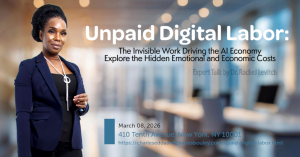Dr. Rachel Levitch, CEO & Founder, Explores Invisible Labor, Technostress, and the AI Economy in New York
Dr. Rachel Levitch explores technostress, automation, and visibility as emerging economic pressures on the modern workforce.
As founding partner of Mangosteen Privacy/GDPR Engineer Co. | A Charles Edda & Charles Bouley Corporation, Dr. Levitch has spent years developing tools to close compliance gaps around unstructured data and digital risk. Her technical leadership — including extensive work in cloud-native security, SIEM, EDR, incident response integration, and open-source orchestration — informs a growing concern: the rising demands placed on individuals to remain visible, relevant, and constantly engaged in digital spaces, often without compensation or protection.
According to the LinkedIn article From Volunteer Work to Invisible Labor: The Rise of Unpaid Digital Work, US culture — and increasingly global culture — now encourages users to constantly produce content: updates, insights, opinions, visuals, videos — all in the name of visibility. The logic is simple but punishing: to be seen is to be considered. To stay silent or invisible is to fall behind. This creates a feedback loop: as machines take on more tasks — from scheduling content to screening job applications — humans are pushed to maintain a constant digital presence simply to signal their relevance and employability. The work itself has not vanished; rather, it has shifted into the unpaid margins of daily life — performed online, often after hours, and without formal recognition as labor. Tasks once viewed as optional, such as maintaining an online persona, sharing professional insights, or tracking engagement, have quietly become mandatory. Now, failing to perform these tasks doesn’t just result in lost attention — it can jeopardize employment opportunities altogether. In this sense, AI hasn’t removed human labor but has redefined its terms, transferring the burden of visibility, creativity, and emotional labor onto individuals, all unpaid. “This is not just a labor issue — it’s a wellbeing crisis,” said Dr. Rachel Levitch. “We’ve entered an era where constant digital output is expected, but never compensated. If we don’t name this as work, we can’t protect the people doing it.”
Grounded in recent scholarship and social analysis, the talk draws from Dr. Levitch’s research and recent writing, including references to the 2013 Oxford study by Frey and Osborne, which warned that nearly half of U.S. jobs were at risk of automation. Levitch also cites the now-viral LinkedIn article Unpaid Housewife, Unpaid Labor, and The Digital Workforce, calling attention to how tasks like content creation, thought leadership, and online engagement have shifted from optional to quietly mandatory — and yet remain unpaid, invisible, and psychologically draining.
Narrowing Pipeline: When Unpaid Labor Meets Algorithmic Exclusion
Even with this relentless unpaid effort, visibility does not guarantee opportunity. As AI automates more tasks and increasingly mediates hiring decisions, traditional employment pathways are narrowing, pushing many workers toward the margins. Those who fail to “win” the algorithmic attention economy or meet invisible, always-on expectations often find themselves forced into gig work, freelance branding, or entrepreneurship — not necessarily by choice, but out of necessity. The market is no longer driven primarily by passion or innovation; instead, survival depends on navigating a system that overlooks many traditional or nonlinear career trajectories.
Adding to this challenge, AI-driven hiring tools and Applicant Tracking Systems (ATS) filter applications using keyword-based algorithms. As a result, “self-taught” or “transferable” skills acquired outside formal education or corporate training are frequently overlooked or deemed illegible. This creates a disconnect between the diverse ways individuals stay relevant — through learning, building portfolios, or freelancing — and what automated systems recognize as valuable labor. Consequently, entrepreneurship often masks unemployment, gig work becomes a holding pattern, and résumé gaps are filled with unpaid projects or content creation, all under the hope that these efforts will someday convert into stable employment. Without institutional or algorithmic validation, many such endeavors remain invisible.
The event will also unpack the concept of technostress, a term coined by Craig Brod, which Levitch repositions as a key framework for understanding today’s digital exhaustion. The talk will integrate models like the Job Demands–Resources (JD–R) Model to demonstrate how unpaid digital labor intersects with burnout, mental health, and algorithmic exclusion.
Dr. Levitch’s analysis points to a growing paradox: while AI is celebrated for increasing efficiency, it has offloaded emotional and creative labor onto individuals — work that’s essential for employability in the 2026 economy, yet excluded from formal compensation and institutional recognition. Dr. Rachel Levitch will be presenting at 410 Tenth Avenue, New York, NY 10001, on March 8, 2026, with a focused talk on the hidden toll of unpaid digital labor in an AI-mediated world. As automation accelerates and visibility becomes currency, the demand for self-managed branding, content creation, and emotional labor has quietly become a new standard — unrecognized, uncompensated, and often unsustainable. This talk will explore how technostress, algorithmic exclusion, and the collapse of traditional career pipelines are reshaping what it means to work and be seen in 2026. If you're navigating the gig economy, platform work, or digital precarity, this conversation is not just timely — it's necessary.
Tickets and Registration
This in-person event will be held at:
410 Tenth Avenue
New York, NY 10001
Date: March 8, 2026
Time: 10:00 AM – 1:00 PM EST
Tickets: https://charleseddaandcharlesbouley.com/unpaid-digital-labor.html
Media inquiries: info@charleseddaandcharlesbouley.com
Miles Barco
Charles Edda and Charles Bouley
+1 800-932-5004
info@charleseddaandcharlesbouley.com
Visit us on social media:
LinkedIn
YouTube
How AI-driven hiring algorithms exclude many workers, especially those with non-traditional skills
Legal Disclaimer:
EIN Presswire provides this news content "as is" without warranty of any kind. We do not accept any responsibility or liability for the accuracy, content, images, videos, licenses, completeness, legality, or reliability of the information contained in this article. If you have any complaints or copyright issues related to this article, kindly contact the author above.



